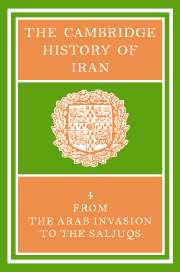Book contents
- Frontmatter
- 1 THE ARAB CONQUEST OF IRAN AND ITS AFTERMATH
- 2 THE ‘ABBĀSID CALIPHATE IN IRAN
- 3 THE ṬĀHIRIDS AND ṢAFFĀRIDS
- 4 The SĀMĀNIDS
- 5 THE EARLY GHAZNAVIDS
- 6 THE MINOR DYNASTIES OF NORTHERN IRAN
- 7 IRAN UNDER THE BŪYIDS
- 8 TRIBES, CITIES AND SOCIAL ORGANIZATION
- 9 THE VISUAL ARTS
- 10 NUMISMATICS
- 11 THE EXACT SCIENCES
- 12 LIFE SCIENCES, ALCHEMY AND MEDICINE
- 13(a) PHILOSOPHY AND COSMOLOGY
- (b) SŪFISM
- 14 THE RELIGIOUS SCIENCES
- 15 SECTS AND HERESIES
- 16 NĀSIR-I KHUSRAU AND IRANIAN ISMĀ‘ĪLĪSM
- 17 ZOROASTRIAN LITERATURE AFTER THE MUSLIM CONQUEST
- 18 ARABIC LITERATURE IN IRAN
- 19 THE RISE OF THE NEW PERSIAN LANGUAGE
- 20 (a) THE “RUBĀ'Ī” IN EARLY PERSIAN LITERATURE
- (b) ‘UMAR KHAYYĀM: ASTRONOMER, MATHEMATICIAN AND POET
- Bibliography
- Index
- Plate section
- Plate section">
- Map 1. Iran under the Abbasids">
- References
17 - ZOROASTRIAN LITERATURE AFTER THE MUSLIM CONQUEST
Published online by Cambridge University Press: 28 March 2008
- Frontmatter
- 1 THE ARAB CONQUEST OF IRAN AND ITS AFTERMATH
- 2 THE ‘ABBĀSID CALIPHATE IN IRAN
- 3 THE ṬĀHIRIDS AND ṢAFFĀRIDS
- 4 The SĀMĀNIDS
- 5 THE EARLY GHAZNAVIDS
- 6 THE MINOR DYNASTIES OF NORTHERN IRAN
- 7 IRAN UNDER THE BŪYIDS
- 8 TRIBES, CITIES AND SOCIAL ORGANIZATION
- 9 THE VISUAL ARTS
- 10 NUMISMATICS
- 11 THE EXACT SCIENCES
- 12 LIFE SCIENCES, ALCHEMY AND MEDICINE
- 13(a) PHILOSOPHY AND COSMOLOGY
- (b) SŪFISM
- 14 THE RELIGIOUS SCIENCES
- 15 SECTS AND HERESIES
- 16 NĀSIR-I KHUSRAU AND IRANIAN ISMĀ‘ĪLĪSM
- 17 ZOROASTRIAN LITERATURE AFTER THE MUSLIM CONQUEST
- 18 ARABIC LITERATURE IN IRAN
- 19 THE RISE OF THE NEW PERSIAN LANGUAGE
- 20 (a) THE “RUBĀ'Ī” IN EARLY PERSIAN LITERATURE
- (b) ‘UMAR KHAYYĀM: ASTRONOMER, MATHEMATICIAN AND POET
- Bibliography
- Index
- Plate section
- Plate section">
- Map 1. Iran under the Abbasids">
- References
Summary
In the preceding volume a survey was made of that part of extant Mazdaean literature the content of which could have been known in the Sasanian era, even though the books were probably or even certainly compiled under Islam. Only those works were excluded which showed obvious signs of contact with Islam, and it is these which are now to be considered.
They were in the first place characterized by a tendency to be explanatory as well as polemical. Their prime object was to set forth the Mazdaean doctrine, whose liturgical texts, however ancient and widespread in usage, were not of a kind to re-establish didactically, still less to defend rationally, that doctrine, which was threatened on all sides. It was a fact that Islam made rapid progress in Iran and even recruited there its principal doctors and upholders, while the number of Mazdaean mōbads qualified to resist them steadily declined. Still more regrettable was the growing scarcity of priests necessary for the conduct of services and purifications, by whom alone the liturgy could be maintained, as the axis of the truly religious life, together with custom and law. Preoccupation with this state of affairs was to be expressed not only in the form of casuistry, to deal with the practical problems raised by this diminution of the priesthood, but also by concern to provide the instruction which was lacking. Thereafter this instruction and catechizing seemed to become more explicit and were addressed, at any rate in the writings, to adult persons who were threatened by conversion to Islam, by indifference or at the very least by ignorance.
Keywords
- Type
- Chapter
- Information
- The Cambridge History of Iran , pp. 543 - 565Publisher: Cambridge University PressPrint publication year: 1975
References
- 5
- Cited by

